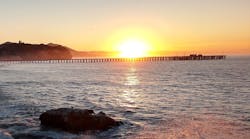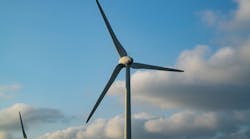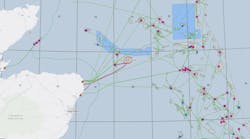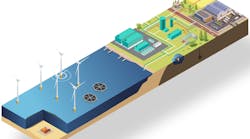Some license shares, operatorships shift
Marshall DeLuca
Business Editor
Over the past year, the governments of several countries have been trying to attract oil and gas producers with favorable licensing terms in order to compensate for their flailing economies. And, despite the risk, the companies are taking the bait.
Several companies have signed agreements with governments in the economically and politically tumultuous region for offshore acreage. The discovery rate has hardly slowed and wells are being brought onstream at a steady pace roughly in line with activity across the globe.
Australia
Australia, although moderately isolated from economic troubles to the north and on mainland Asia, is still feeling the economic crunch of its neighbors. However, the country continues to maintain a strong foothold in the offshore oil and gas industry.The Department of Primary Industries and Energy (DPIE) of Australia recently signed a memorandum of understanding with the US Department of the Interior's Minerals Management Service (MMS).
Under this agreement, the two agencies have renewed plans of an exchange of scientific and technical information relating to offshore oil and gas drilling. Topics include resource assessment, environmental protection, energy leasing, offshore installations, and pipelines.
As far as bidding is concerned, the country has offered 58 permits for initial six-year terms in the past year. The major proportion of permits (31) is for the region off Western Australia. Bidding closed last month for 28 of the areas and the remaining 30 will close on February 18 of next year. Twelve new contracts were also recently awarded in the Western region to operators such as West Oil, Gulf Resources, Oryx, Shell, Santos, and Woodside.
On the discovery side, several key finds have been made. Apache encountered oil on its Legendre block off Western Australia and has confirmed the hydrocarbon potential of the Caribou field in the Northwest Australia Carnarvon Basin. Apache has also brought its Stag plaform in the area onstream with peak production of 25,000 b/d of oil.
The zone of cooperation area (ZOCA) between Australia and Indonesia is also remaining a focus in the region with Shell's Sunset-1 discovery and Woodside's adjacent Sunrise-2 discovery. The two companies are planning an LNG and domestic gas project in the area called the Northern Australia Gas Venture which would feed gas from the discoveries to a processing plant in Darwin.
Also in the ZOCA, Phillips and BHP have delayed LNG production from the Bayu-Undan gas field due to disagreements over the location of the processing plant. BHP has opted for an offshore installation while Phillips supports an onshore facility. Startup of the proposed facility has been pushed back to the 2005-2006 time frame, from 2002.
Cambodia
Cambodia granted six licenses to several international companies, however, four of the licenses are currently under a boundary dispute. The government signed Provisional Conditional Petroleum Agreements with three international consortia - Conoco and Idemitsu, Enterprise and BHP, and BHP and Inpex, for Cambodia-Thailand disputed areas 1 and 2, 3, and 4, respectively.Until an agreement is reached between the two countries to jointly develop the overlapping area with revenues split 50:50, exploration activity cannot begin. Once an agreement is reached, which is expected within the next five years, the agreements will be replaced with full production sharing contracts. The companies have begun preliminary work while awaiting the decision.
The other two licenses were awarded to Woodside and partner Cambodian Resources. The companies were granted Blocks 5 and 6 for a five year exploratory period with an initial exploration term of two years with two extensions of two years and one year.
China
China has also been keeping busy. The country began the year with a 20 block bidding round. China National Offshore Oil (CNOOC) opened the round for three months and included some 98,800 sq km of acreage in every region except the Bohai Gulf.Several contracts have also been signed in the country's waters. Agip has signed two contracts in the Bohai region for the Beipuxi PSCA in Bohai Bay with CNPC and PSCA 09/11 with CNOOC in the western Bohai Gulf. Elsewhere in Bohai, XCL signed a production sharing agreement with China National Oil and Gas Exploration and Development for the Zhang Dong Block and Apache agreed with Texaco for a 50% interest and operatorship of Blocks 09/18 and 11/19. CNOOC also announced a contract for an 850-sq km area in the Gulf of Chilhi in the Yellow Sea with ENI of Italy and the expansion of an agreement with Arco for the Ledong gas field in the South China Sea to include structures in the nearby Wenchang area.
On the production side, Statoil brought the 35 million bbl Lufeng Field onstream in Block 22-1 in the South China Sea. Peak production is set at 60,000 b/d through two wells to the Navion Munin production ship. Also, EDC has drilled appraisal wells in the Chengdaoxi PSCA on the Shengli Field complex in the southern portion of Bohai Bay. The area is reported to hold 400 million bbl of proven reserves in place.
Discoveries also have been mounting. In Bohai, Phillips made a discovery in PSCA 11/05 and COBHC made two discoveries with wells QK 17-9-2 and QHD 30-1N-1. Santa Fe also made a discovery on its Ursa prospect in the Pearl River Mouth Basin and Primeline firmed up estimated reserves of 660 Bcf of gas on its Vicky exploration area in Block 32-32 in the East China Sea.
Indonesia
Pertamina, Indonesia's state oil company has offered several new contracts over the past year in order to bolster the country's foreign investment. The government-owned company offered eight areas for "direct negotiation" production sharing contracts and nine additional areas are open for tender. These include areas off South Sulawesi, Irian Jaya, and East Kalimantan. Negotiations have been concluded for three areas off East Kalimantan and the remaining areas are expected to be concluded soon.Of the major awards, Santos, Coastal, and Cue Sampang were granted rights in the Sampang Block in the East Java Sea, while Unocal was granted the 1.2 million-acre Ganal concession in the Markham Delta. In another ceremony, Shell was awarded the 6,250 sq km Bukat PSC in the Tarakan Basin and a consortium of Japex, Teikoku, and Taiyo were awarded the Kapoposang PSC. Also in still another ceremony, YPF, Conoco, and Copares were awarded the South Sokang PSC in the Natuna Sea; PT Wirabuana was awarded the Karapan PSC in the northeast Java Sea; Gulf Resources opted for the Ketapang PSC also in the northeast Java Sea; and Total was awarded the Walo PSC off western Irian Jaya.
On the activity front, the Indonesian deepwater has been continuing to prove its worth as a major play with several deepwater discoveries. Unocal has been the most aggressive player in the deepwater region with a majority of the discoveries. The company encountered success with its Merah Besar #9 and #10, Hitam Besar, and Hijau Bear wells in the Merah Beasr region off East Kalimantan, as well as the discovery of the Seno prospect in the Kutei Basin with estimated reserves between 220 and 720 million bbl BOE.
Arco and Conoco also experienced success off Indonesia. Arco is continuing to show progress on its prolific shallow water Vorwata prospect in the Berau PSC with the drilling of several delineation wells. The company suspended wells 5 and 11, both as gas discoveries, in recent months.
Conoco discovered oil and gas in the South Natuna Block "B" PSC extension in the West Natuna Sea. The well will be used to prove-up feedstock to supply the West Natuna Gas Project which will deliver 325 MMcf/d of gas to private consumers in Singapore.
Malaysia
Several companies have made first-time appearances in Malaysia. Amerada Hess is making its first exploration attempt in the region with the awards of Blocks PM-304 and SK-306. Both block were awarded to the company for initial five-year periods. Santa Fe also entered the region for the first time with the award of Block PM-308 off the east coast of the peninsula. The block includes the 1992 discovery - Rhu Field, which is deemed potentially commercial.Also, Shell reinforced its position in the region with an asset swap with Occidental. Shell received all of Oxy's interests in the offshore Sarawak region (Blocks SK-3 and SK-8), and all of Oxy's shares in the MLNG Tiga joint-venture. Shell also signed a production sharing contract for SK-308 in the Central Luconia Province of the Sarawak Basin.
Also of interest off Malaysia is progress on the much anticipated development of the Cakerwala Field in Block A-18 of the Malay-Thai joint development area. Final approval was given to Triton Energy to develop the disputed field, which is expected to produce 2 Tcf of gas. The company is currently undergoing cost and technical studies on the project.
On the production side, Esso has commenced production from two platforms. Production has begun from the Seligi F platform at peak production rates of 21,000 b/d, and the Raya A platform in PM-8 at peak rates of 24,000 b/d.
Myanmar (Burma)
Activity in Myanmar (Burma) seems to be on the decline. Reasoning behind this has been speculated on political pressures imposed by several countries, including US economic sanctions.Arco for example has withdrawn from the country and relinquished several blocks including Block M-7 and M-9. However, the company denies that political pressure had any bearing on the decision. Texaco has also withdrawn from the region, partly due to US government pressure, and transferred operatorship of its acreage to UK-operator Premier.
However, before its withdrawal, the company did make the Aung Zay discovery in Block M-12 in the Mottama Basin. Following the transfer from Texaco, Premier began an eight-well development drilling program on the Yetagun Field in the Gulf of Martaban. However, the company has abandoned one well, YE-4, on which the driller was using as an appraisal of a southeastern extension of the field.
Philippines
The Philippino government has awarded five offshore contracts in recent months amid reports of several exploration disappointments in various plays. The contracts, known as GSEC's 93, 94, 95, 96, and 97, cover almost 70,000 sq km of area.GSEC 93, located in the East Visayan Sea, was granted to an Alcorn-led consortium for a 12-month term. The second contract, GSEC 94 in the South Palawan/Reed Bank area, was taken by Trans-Asia and partners for a 15-month exploration term. GSEC 95 in the Northeast Palawan/Cuyo Basin was granted to Australia's Socdet, while GSEC 96 in the same region, was taken by Murphy and partner South China Petroleum & Exploration. The most recent contract, GSEC 97, also in the Reed Bank area, was awarded to Dragon, Philodrill, and Petrofields for an initial 18-month term.
However, several disappointments have also occurred off the Phillippines. Shell concluded a three-well program off Palawan Island in the Cliffhead play of GSEC 91 (estimated with reserves of 400 million bbl or 2 tcf of gas) with a dry hole. Sodec also reported a dry hole with its Dimipac-1 well in Northwest Palawan Basin GSEC 77.
Thailand
Thailand also kept up the pace with a licensing round and activity in the Benchamas, Tantawan, and Bunga Kekwa fields. The Thai government held its 17th licensing round with 10 blocks on offer in the Gulf of Thailand. The round included all acreage which remained open following the 15th licensing round. Total acreage offered was 73,650-sq km.Also, the government awarded a 17,712-sq km block to a Kerr McGee-led group as part of the 16th licensing round. Block W7/38 in the Mergui Basin was awarded to Kerr McGee, Amerada Hess, and PTTEP for a two phase six-year exploration period.
Rutherford Moran added three additional wells to its Benchamas development increasing the number to 19 successful wells since drilling began in 1995. The company also decided to add a fifth production platform to its Tantawan field in Block B8/32.
Production from this platform is expected in April of next year. On the Bunga Kekwa Field in Block PM 3 CAA, reserves have been upped 14.7% due to increased oil recovery and optimized water injection as part of results of the first phase of the field's development. Phase 1 was completed last year and the field has already produced a total of 2.5 million bbl of oil at 13,000 b/d.
Vietnam
Vietnam is also attracting international interest with the granting of exploration contracts and several discoveries. PetroVietnam, the state oil company, is in the final stages of negotiations with foreign companies for five exploration contracts and are expected to be completed by early next year.The locations of the permits have not been released, but are expected to be off the southern coast. The company has signed its 33rd agreement with foreign partners for oil and gas exploration. PetroVietnam signed an agreement originally announced last year with Geopetrol of France, a Conoco-led consortium, and two South Korean companies for the exploration of Block 15-1.
PetroVietnam also signed a pre-unitization agreement with Malaysia's Petronas covering the extension of the Bunga Kekwa oil field from the PM-3 Commercial Arrangement Area into Vietnamese waters. the agreement allows the parties involved in the development of the field to begin working on the potential unitization of the field and incorporate the Vietnamese extension into the plans.
Lundin Oil, Unocal, and JVPC have proven the potential of the Vietnam offshore play in recent months with several discoveries. Lundin discovered the new North Bunga Pakma oil and gas field situated in Block PM-3 in the Commercial Arrangement Area between Malaysia and Vietnam. While Unocal encountered gas success in Block B off the southwestern coast with the company's first well in Vietnam. And JVPC has made a new oil find in Area A of the Ran Dong oil and gas field.
Copyright 1998 Oil & Gas Journal. All Rights Reserved.






